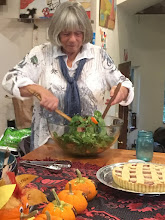Refreshments seem to always be served at Chautauqua lectures, sponsored by the Oregon Council for the Humanities, but Tobe Porter, the Port Orford librarian, made a unique connection between my lecture topic—our relationship to food—and the refreshments for my lecture at the Port Orford library. She suggested a potluck of dishes inspired by a book, accompanied by the books themselves.
The table was crowded with food and books. The biggest hit was three bottles of dandelion wine, standing behind Ray Bradbury's book by the same name. I haven't read the novel, but I can attest that the wine was superb, though I didn't have more than a taste, not wanting to be loopy at the podium. Hershey's chocolate kisses spilled cornucopia-like at the base of Charlie and the Chocolate Factory. A plate of grapes, meant to refer to Grapes of Wrath, was a clever pun. A golden-brown, creamy-soft spoonbread sent good Southern smells wafting around Maya Angelou's Hallelujah! The Welcome Table, and a pan of cornbread paid tribute to its accompanying book, a 1945 cookbook that included kitchen tips like how to cook with war rations and how to substitute meat drippings for butter. One woman's soft gingerbread cookies, inspired by a passage about little gingerbread cakes in her favorite book from childhood, The Five Little Peppers and How They Grew, were childhood delicious and answered precisely the way I interpreted the assignment: to find somewhere in a book you liked a reference to food you would like to make.
I had an advantage in fulfilling the assignment because I had researched literary references to food for my lecture, from Beowulf's mead to the turkey Scrooge gives the Cratchitt family for Christmas to turtle soup from Babette's Feast. Because I was busy preparing for the lecture, I thought about bringing something simple—an apple for the Biblical reference or for Sleeping Beauty; pomegranate seeds in reference to Demeter and Persephone or a peach in honor of T. S. Eliot's Prufrok, who says, in contemplating old age, "Do I dare to eat a peach?" I also thought about bringing mutton kidneys, a favorite food of Leopold Bloom, protagonist of James Joyce's Ulysses, but decided not to, maybe because it wouldn't have been a potluck favorite but mostly because Bloom likes mutton kidneys because they "give to his palate a fine tang of faintly scented urine," something I thought we could do without at the lecture. In the end, I made a dish suggested in A Midsummer Night's Dream by Titania, the fairy queen. Charmed by a potion while asleep, she awakes to fall in love with Bottom, who has already been turned into an ass, and asks her fairies to "feed him with apricocks and dewberries,/ With purple grapes, green figs, and mulberries." The fruits must have been beautiful, offered to Bottom—the orange apricots, black berries, purple grapes, green figs, all fresh and plump and bright. My own offering to the literary potluck wasn't quite as lovely since the apricots were canned and the blackberries frozen and the figs were brown because I couldn't find green ones and I blended everything too much with the addition of vanilla yogurt. But there was more reason than the usual one for Titania to give Bottom these foods: apricots, grapes, figs, and berries are all, as Shakespeare must have known, aphrodisiacs. I'm not sure I was really looking to snag a date at my lecture, but as far as I could tell, the aphrodisiacal properties of my dish were lost on my audience—except maybe for the woman who leaned suggestively against the chest of her partner as I talked about the meanings of food, literary and otherwise.
Next week: "Dinner with Eileen"

No comments:
Post a Comment